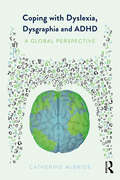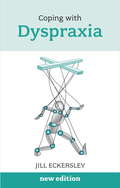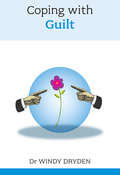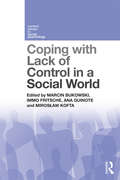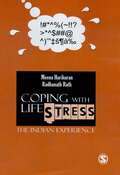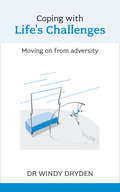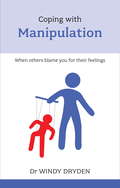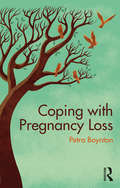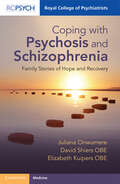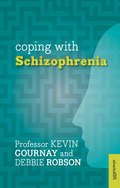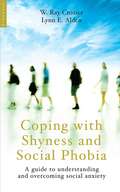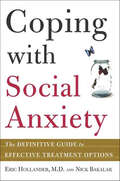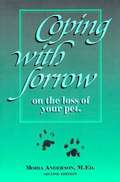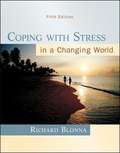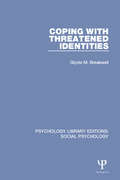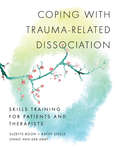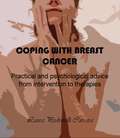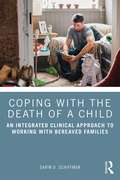- Table View
- List View
Coping with Dyslexia, Dysgraphia and ADHD: A Global Perspective
by Catherine McBrideCoping with Dyslexia, Dysgraphia and ADHD: A Global Perspective uniquely incorporates dyslexia, dysgraphia, and ADHD into one volume, offering practical advice on how to manage each of these disorders. McBride combines a solid research base with interviews with specialists in learning disabilities, as well as parents, teachers, and students with personal knowledge of each difficulty from six continents. The innovative cross-cultural focus of the book is emphasized in the introduction, which is followed by one chapter each on the basics of each of these learning difficulties and another three chapters on their remediation. The book goes on to cover topics such as comorbidities across learning or other difficulties, learning of multiple languages, facilitating self-esteem, and enhancing reading comprehension and writing composition in the face of dyslexia, dysgraphia, and ADHD. Appendices with short, practical tips on learning, multi-media resources, and ways to test and train cognitive-linguistic skills are included as an additional resource. Coping with Dyslexia, Dysgraphia and ADHD: A Global Perspective is intended for practitioners, teachers, parents, and those with any or all of these learning difficulties. University or postgraduate students who wish to understand more about dyslexia, dysgraphia, and/or ADHD will also benefit from the clear analysis. With this book, the reader will not only come to understand the fundamental nature of these learning difficulties, but will also get to know the people whose lives are so deeply affected by them.
Coping with Dyspraxia
by Jill EckersleyDyspraxia is believed to affect up to 10% of the population, and involves difficulties with physical co-ordination. Children with dyspraxia may find it hard to learn to write, tie shoelaces or join in P.E. lessons. Adults with dyspraxia may find everyday tasks problematic, such as using a tin-opener, having a bath, playing sport or, in some cases, even speaking clearly. This updated edition of Coping with Dyspraxia explains how this condition may affect people, and how to cope with it, at any stage of life.
Coping with Dyspraxia
by Jill EckersleyDyspraxia is believed to affect up to 10% of the population, and involves difficulties with physical co-ordination. Children with dyspraxia may find it hard to learn to write, tie shoelaces or join in P.E. lessons. Adults with dyspraxia may find everyday tasks problematic, such as using a tin-opener, having a bath, playing sport or, in some cases, even speaking clearly. This updated edition of Coping with Dyspraxia explains how this condition may affect people, and how to cope with it, at any stage of life.
Coping with Guilt
by Windy DrydenDo you sometimes wish you could turn the clock back and re-live past mistakes? Do you feel it's your responsibility to make others happy? Are you more worried about hurting others than living your own life? Guilt is a common and destructive emotion, but, using the principles of C.B.T. this book shows how it can be put to positive use. Whether it concerns sins of omission, or sins of commission, this book demonstrates that you don't always have to live up to unrealistically high expectations of yourself, and shows how to move on. Topics include: differentiating between healthy remorse and destructive guilt; how to deal with specific episodes of guilt coping with blame and manipulation; how to accept and value yourself; how to practise healthy self-care tackling unhelpful beliefs that perpetuate guilt.
Coping with Guilt
by Windy DrydenDo you sometimes wish you could turn the clock back and re-live past mistakes? Do you feel it's your responsibility to make others happy? Are you more worried about hurting others than living your own life? Guilt is a common and destructive emotion, but, using the principles of C.B.T. this book shows how it can be put to positive use. Whether it concerns sins of omission, or sins of commission, this book demonstrates that you don't always have to live up to unrealistically high expectations of yourself, and shows how to move on. Topics include: differentiating between healthy remorse and destructive guilt; how to deal with specific episodes of guilt coping with blame and manipulation; how to accept and value yourself; how to practise healthy self-care tackling unhelpful beliefs that perpetuate guilt.
Coping with Lack of Control in a Social World
by Ana Guinote Immo Fritsche Marcin Bukowski Mirosław KoftaCoping with Lack of Control in a Social World offers an integrated view of cutting-edge research on the effects of control deprivation on social cognition. The book integrates multi-method research demonstrating how various types of control deprivation, related not only to experimental settings but also to real life situations of helplessness, can lead to variety of cognitive and emotional coping strategies at the social cognitive level. The comprehensive analyses in this book tackle issues such as: Cognitive, emotional and socio-behavioral reactions to threats to personal control How social factors aid in coping with a sense of lost or threatened control Relating uncontrollability to powerlessness and intergroup processes How lack of control experiences can influence basic and complex cognitive processes This book integrates various strands of research that have not yet been presented together in an innovative volume that addresses the issue of reactions to control loss in a socio-psychological context. Its focus on coping as an active way of confronting a sense of uncontrollability makes this a unique, and highly original, contribution to the field. Practicing psychologists and students of psychology will be particularly interested readers.
Coping with Life Stress: The Indian Experience
by Meena Hariharan Radhanath RathThis book provides a new perspective to the theories of stress and coping. A holistic treatment related to stress and coping through Indian case reports and analyses makes this book unique. This volume provides useful theoretical and practical inputs on effective coping under varying internal and external conditions. Analysis of Indian cases with contrasts from western culture explains the role culture plays in the coping strategy. The interactive exercises included could be used as tools for diagnosis along with practical suggestions for stress management and coping for the readers.
Coping with Life's Challenges: Moving On From Adversity
by Windy DrydenLife's challenges range from redundancy, relationship break-up and illness, to other people's disapproval, rejection and betrayal. Events may shake your sense of identity and leave you feeling insecure, but this isn't the end of the story. Using techniques based on Cognitive Behaviour Therapy (CBT), this book looks at how to surmount difficult but common adversities so that you can move on. Topics include: facing up to inherited tendencies and personal limitations identifying and dealing with areas where you are not in control. living with uncertainty and loss coping with job loss making healthy choices in relationships dealing with failures dealing with unfairness and injustice While even the luckiest of us must sometimes face adversity, we can learn to deal with difficult situations.
Coping with Manipulation
by Windy DrydenThis book focuses on the common situation when someone blames you for the way they feel. It explores the underlying reasons why others may refuse to take emotional responsibility for themselves, and looks at what you can do about it. It's possible to let people feel what they want to feel - and live at peace with them and with yourself.
Coping with Manipulation
by Windy DrydenThis book focuses on the common situation when someone blames you for the way they feel. It explores the underlying reasons why others may refuse to take emotional responsibility for themselves, and looks at what you can do about it. It's possible to let people feel what they want to feel - and live at peace with them and with yourself.
Coping with Pregnancy Loss
by Petra BoyntonPregnancy loss can leave us with many unanswered questions, and knowing where to find answers is not always clear. This book is for you if, like me, you’ve been affected by any kind of pregnancy loss – currently or in the past. It provides practical advice and self-care strategies to help you cope during or after loss, alongside ideas that will enable you to make sense of what’s happened – including understanding your feelings and choices; outlining what you can expect during and after your loss; ways to navigate physical and mental health care (if appropriate); and thinking about how to remember your baby. It’s for charities, support groups, therapists, and healthcare professionals who want to provide support and care. We all react – and cope with loss – in different ways, and this book respects diverse needs when it comes to getting information and help. You don’t have to feel like you are going through your loss alone. In this book you’ll find reflection exercises, self-help resources, and stories and suggestions from other people about how they survived, which should leave you feeling more confident and better able to seek additional support if you need it.
Coping with Psychosis and Schizophrenia: Family Stories of Hope and Recovery
by Juliana Onwumere David Shiers OBE Elizabeth Kuipers OBESupporting a relative living with a psychotic disorder can be uniquely challenging when compared to other health conditions, leaving many family carers isolated and struggling with questions: Why us? How do others cope? Is it my fault? How much more can I take? This collection of personal accounts provides family carers with a helpful framework to make sense of their individual experiences and support their own coping and wellbeing. It details the myriad of positives, challenges and life-changing experiences that families encounter following the development of a psychotic illness in a loved one. The authors of these accounts are varied and include the parents, partners, siblings and children of those experiencing psychosis. This book will also serve as an excellent resource for psychiatrists, psychiatric nurses, psychologists, social workers, GPs and students who should find the book relevant both for their own practice and for those families they support.
Coping with Schizophrenia
by Kevin GournaySchizophrenia is traditionally difficult to define and commonly misunderstood, but involves problems differentiating inner experiences and perceptions to everyday external reality. This book provides up-to-date information about changing views on schizophrenia and how it can be treated. As well as exploring classic symptoms such as hallucinations and hearing voices, it provides strong practical suggestions for dealing with the mental and emotional distress involved. Topics include: History of name and diagnostic categories; Myths and facts about schizophrenia; Medication; Therapy (especially CBT); Professional help; Diet and exercise; Social support; Work and leisure; Dealing with stress in the family; Stigma, discrimination and educating the public.
Coping with Schizophrenia
by Kevin GournaySchizophrenia is traditionally difficult to define and commonly misunderstood, but involves problems differentiating inner experiences and perceptions to everyday external reality. This book provides up-to-date information about changing views on schizophrenia and how it can be treated. As well as exploring classic symptoms such as hallucinations and hearing voices, it provides strong practical suggestions for dealing with the mental and emotional distress involved. Topics include: History of name and diagnostic categories; Myths and facts about schizophrenia; Medication; Therapy (especially CBT); Professional help; Diet and exercise; Social support; Work and leisure; Dealing with stress in the family; Stigma, discrimination and educating the public.
Coping with Schizophrenia: A CBT Guide for Patients, Families and Caregivers (Coping With...)
by Steven Jones Peter HaywardThe only book written specifically for sufferers, as well as their carers and loved ones, this empowering book takes a sensitive and understanding approach to schizophrenia, providing all the information necessary about the condition, its causes, and the range of treatments available. Dr Steven Jones is Senior Lecturer in Clinical Psychology at the University of Manchester, Academic Division of Clinical Psychology, Wythenshawe Hospital, Manchester, UK and Honorary Consultant Clinical Psychologist at Pennine Care Trust, UK.
Coping with Shyness and Social Phobia: A Guide to Understanding and Overcoming Social Anxiety
by W. Ray Crozier Lynn E AldenSocial anxiety is the third largest psychological problem in the United States today, affecting 15 million Americans in any given year. Packed with case studies this handy guide includes up-to-date information on the range of treatments that are available, including cognitive behavioural therapy and medication, and gives an objective appraisal of their effectiveness and limitations. The authors also explain the crucial distinction between shyness and the debilitating effects of social phobia. W. Ray Crozier is Professor of Psychology at the University of East Anglia, UK. L.E. Alden is Professor of Psychology at the University of British Columbia, Canada.
Coping with Snoring and Sleep Apnoea
by Jill EckersleySnoring is no joke! It can interrupt sleep and make days miserable, and wreak havoc in close relationships. And sleep apnoea, which causes severe daytime sleepiness, is a real danger to health and can wreck lives ? sometimes literally in the case of tired driving. If you?ve had enough of people making jokes about your snoring, or you are the long-suffering partner of a chronic snorer, this book will help. This thoroughly updated new edition has a special emphasis on sleep apnoea, which affects some 80,000 people in Britain. A new chapter explains how rising levels of obesity are contributing to both snoring and sleep apnoea. This book also explores the related health risks of sleep apnoea and possible snoring, including high blood pressure, heart attacks and stroke, irrespective of weight issues. Other topics include: the link with allergy, and asthma in particular updated snoring remedies and medication how to get a diagnosis, what your GP can offer, and treatment from your dentist surgery simple cures and lifestyle measures complementary medicine help for the victim of snoring, or snoree!
Coping with Snoring and Sleep Apnoea
by Jill EckersleySnoring is no joke! It can interrupt sleep and make days miserable, and wreak havoc in close relationships. And sleep apnoea, which causes severe daytime sleepiness, is a real danger to health and can wreck lives – sometimes literally in the case of tired driving. If you’ve had enough of people making jokes about your snoring, or you are the long-suffering partner of a chronic snorer, this book will help. This thoroughly updated new edition has a special emphasis on sleep apnoea, which affects some 80,000 people in Britain. A new chapter explains how rising levels of obesity are contributing to both snoring and sleep apnoea. This book also explores the related health risks of sleep apnoea and possible snoring, including high blood pressure, heart attacks and stroke, irrespective of weight issues. Other topics include: the link with allergy, and asthma in particular updated snoring remedies and medication how to get a diagnosis, what your GP can offer, and treatment from your dentist surgery simple cures and lifestyle measures complementary medicine help for the victim of snoring, or snoree!
Coping with Social Anxiety: The Definitive Guide to Effective Treatment Options
by Nick Bakalar Eric HollanderAn essential guide for the 5.3 million American sufferers of social anxiety from a leading psychiatrist and researcherAn estimated 5.3 million Americans experience social anxiety disorder, making it the third most common psychiatric illness in the United States. Unlike people with simple shyness, people with social anxiety disorder become sick with fear in social situations, experiencing physical symptoms like sweating, trembling, a shaky voice, or a pounding heart. They realize their fears are irrational, but they are virtually incapable of maintaining healthy relationships and performing everyday tasks in public settings without medical treatment.In Coping with Social Anxiety, Eric Hollander, director of the Compulsive, Impulsive, and Anxiety Disorders Program at the Mt. Sinai Medical Center explains- the nature of social anxiety disorder and how it differs from simple shyness and phobia- the latest research on the physiological effects of social anxiety disorder and its links with depression- the full range of treatment options-and how to select the best therapeutic course with the help of a medical professionalIllustrated by accounts of successful treatment from Hollander's clinical practice, this book will help readers make informed judgments about the proper treatment to seek for themselves or someone close to them.
Coping with Sorrow on the Loss of Your Pet (2nd Edition)
by Moira AndersonHere's the best book we've ever seen on dealing with grief due to pet loss, plus a chapter on how to find a lost pet.
Coping with Stress in a Changing World (5th Edition)
by Richard BlonnaUseful, thorough, and student-friendly, this volume empowers students to take control of their lives. The author's practical framework enables students to recognize stresses and implement effective strategies.
Coping with Threatened Identities (Psychology Library Editions: Social Psychology #5)
by Glynis M. BreakwellPeople cope with threats to their identities in many different ways. Until the original publication of this title in 1986, there had been no theoretical framework within which to analyse their strategies for doing this, or to examine the nature and impact of the threatening experiences themselves. In this elegant and original book, Glynis Breakwell proposes an integrative model which explores the structure of identity and the principles directing its development. Focusing on examples of threat such as unemployment, sexually atypical employment and ethnic marginality, Breakwell examines the relation of the individual to social change. Through her sensitive use of case studies, she enables the victims of threat to speak for themselves about their experiences and feelings. Their reactions illustrate her proposed framework of three levels of coping strategies – intra-psychic, interpersonal and intergroup – and her assessment of the factors which limit the success of such strategies. The case studies also point to new evidence on the effects of unemployment and the impact of youth training schemes at the time. This title would have been essential reading for a range of undergraduate courses in social and abnormal psychology and individual differences, as well as for postgraduate training in clinical and medical psychology at the time. Social workers, counsellors and all those concerned with the care of the sufferers of threatened identities will still find it both informative and influential.
Coping with Trauma-Related Dissociation: Skills Training for Patients and Therapists
by Onno Van Hart Suzette Boon Kathy SteeleA patient-oriented manual for complex trauma survivors. This training manual for patients who have a trauma-related dissociative disorder includes short educational pieces, homework sheets, and exercises that address ways in which dissociation interferes with essential emotional and life skills, and support inner communication and collaboration with dissociative parts of the personality. Topics include understanding dissociation and PTSD, using inner reflection, emotion regulation, coping with dissociative problems related to triggers and traumatic memories, resolving sleep problems related to dissociation, coping with relational difficulties, and help with many other difficulties with daily life. The manual can be used in individual therapy or structured groups.
Coping with breast cancer
by Laura CarraraFrom the moment you receive a diagnosis of cancer, life changes. At that moment, it is like a bolt from the blue. There are many states of mind that are lived, from fear to impotence, from anger to despair. Every woman, however, has a great vital force within herself that she brings out more than ever in critical moments and which helps her to overcome even such a hard and complex path. In this period of continuous checks, treatments and surgical procedures, women often find themselves having to make decisions, to make choices, exactly when they have to concentrate all their strength and thoughts on themselves. This book is based both on personal and professional experiences, which I had as a psychologist in the medical oncology, breast surgery and imaging breast diagnostic units. It has been conceived as a helping support for women who must undergo breast surgery or have already undergone it, to obtain some practical and psychological suggestions for dealing better with the surgical-medical path. Reading this text will be useful also to relatives and friends, who often do not know how to react and who feel much more powerless than the woman herself does. The covered topics concern: Packing the bag for the hospitalization, with the specific tricks foreseen for the breast surgical intervention. An overview on the main therapies and some useful precautions to reduce the symptoms of the therapies (chemo, radiotherapy, hormone therapy) or to better live with them (pieces of information about wigs and turbans, etc.; the targeted use of makeup). Psychological suggestion regarding the relationship with one's children, relatives and friends. Suggestions to relatives and friends on how to behave with a breast-operated woman. The basic rules to find psychological wellness. Effective communication techniques. Stress management. A mention of civil and work rights for cancer patients.
Coping with the Death of a Child: An Integrated Clinical Approach to Working with Bereaved Families
by Darin D. SchiffmanCoping with the Death of a Child shows clinicians how to integrate various therapeutic modalities and clinical approaches to grief therapy into one comprehensive model linked to positive change. This integrated model shows mental health professionals how to offer practical and emotional support to the bereaved using descriptions of treatments, care protocols, and guidelines. Through this approach, practitioners can foster interpersonal support and growth among families, even when grieving styles and timing differ between individuals. Clinicians and the families they treat will come away from the book with tools for recognizing distorted and pathogenic exchanges between family members, for valuing the emotional elements of their individual experiences, and for shifting toward solution-focused activities.
